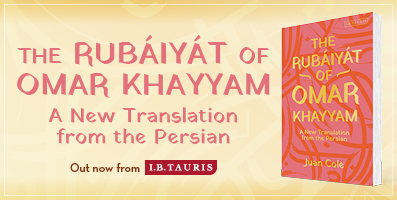Ann Arbor (Informed Comment) – Today my new translation of the Rubaiyat of Omar Khayyam is out from I.B. Tauris/ Bloomsbury. I hope you all enjoy it!
I make an argument in the historical epilogue to my translation that this volume is an anthology by many poets and that a custom had grown up of attributing them to the great astronomer, who died in 1131 AD. The poetry was actually produced mainly in the era of the Mongol invasions and rule of Iran in the 1200s, which were followed by the Black Death in the mid-1300s. One high Iranian bureaucrat who saw the destruction wrought on a town by the Mongol invaders said it immediately put him in mind of a quatrain of Omar Khayyam.
In times of invasion, war and plague, people are often turned inward, stuck at home, concerned with the well-being of themselves and their loved ones, and seeking release of various sorts.
This poetry is full of these themes. I have translated it in what my publisher called an “aggressively modern” style, in contrast to the Victorian Romantic approach of Edward FitzGerald, whose 1859 rendering became a great world classic.
This is what novelist Michael Chabon said about the book:
- “’To read Juan Cole’s deft, plain-spoken translation of the Rubáiyát is to find companionship, to rejoin a thousand-year human conversation about how to endure, enjoy, and find a fleeting beauty in everlastingly dire times. The lucid, cogent and mind-opening Epilogue is a kind of grace, a gift freely given, from one of our most astonishing and generous intellects.’”
― Michael Chabon, Pulitzer Prize winner and author of Moonglow (2017)
Getting our own spiritual bearings and being self-reliant is important at this moment, the Rubaiyat tells us:
In monasteries, temples and retreats
they fear hellfire and look for paradise.
But those who know the mysteries of God
don’t let those seeds be planted in their hearts
The Rubaiyat of Omar Khayyam counsels us, in times of uncertainty,
Since we can’t trust tomorrow,
find a way to fill this lovelorn heart with joy:
Drink up in the light of the moon– a moon that someday
will look for us …and not find us.
Everybody knows that what with couples cooped up with one another 24/7 there is going to be a baby boom in nine months. The Rubaiyat does not neglect the themes of romance and love:
Get up quick and bring me some wine—this is no time for talk!
Tonight, your lush lips are my daily bread.
Pour me some Shiraz as red as your blushing cheeks.
My past repentance is as tangled as your curls.
Order from
or Nicola’s Books in Ann Arbor, who will ship it to you
or Literati Bookstore in Ann Arbor, who will ship it to you
or Amazon
(I’d have loved to direct readers also to Barnes & Noble and but they don’t seem to have the book yet).
It is, of course, available wherever fine books are sold and many local bookstores have curbside service during the quarantine.
Here is what Iranian-American novelist Porochista Khakpour is saying:
“’Omar Khayyam is a Persian treasure and Juan Cole’s new translation brings him anew to Western audiences who for centuries have been both delighted and educated by this medieval sage! Reading The Rubáiyát is a thrill – you feel the echoes of the 12th century seamlessly into our 21st, as this is a holy book of wisdom and magic. In another perilous era for Iranians, it’s wonderful to see this enchanting volume make its way through the world yet again!’” ―Porochista Khakpour, novelist, essayist and author of Brown Album (2020)
Many thanks to her for the kind words!




 © 2026 All Rights Reserved
© 2026 All Rights Reserved